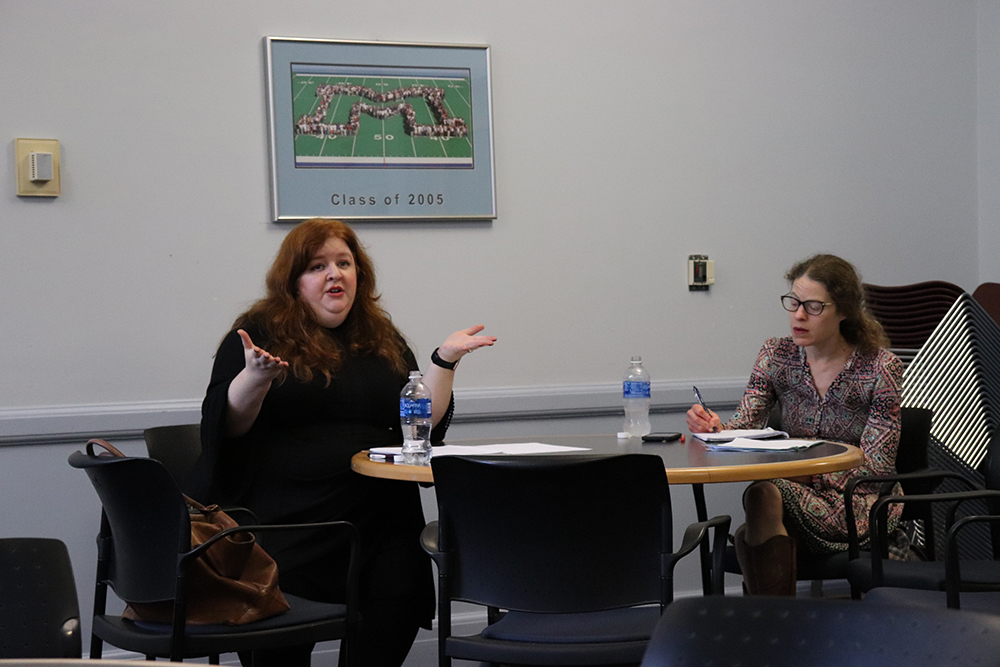On Wednesday, Oct. 26, English Professor Dr. Faith Barter gave a talk about the importance of legal form in 19th-century Black literature. The talk was held in the Coe Room in the Memorial Union and was hosted by the woman, gender and sexuality studies department as a part of their WGS at work series.
Barter’s talk “Black Pro-Se: Authorship and the Limits of Law in 19th Century African American Literature” discussed ideas from her upcoming book.
Barter was a lawyer before becoming an English professor. She was born in Gardiner, Maine.
then moved to Washington D.C. and practiced as a lawyer. After realizing that was not what she wanted to do she went back to get her doctorate in English which had also been her undergraduate area of study. She is currently working as an assistant professor of English at the University of Oregon. She is also affiliated with the Black studies program.
Barter’s talk discusses jurisdiction and how Black writers use established rules of law in order to find a place for themselves. Her background sparked her interest in how legal form was used in early Black writing in America.
“They used legal form as technology to disrupt literary genres,so many Black narratives go against existing genres” Barter said.
The talk focused heavily on the impacts of jurisdiction and sovereignty in relation to the 19th century. Barter noted the duality of jurisdiction as both the place where power is held and the tool to use that power. Barter noted how jurisdiction was taken beyond the idea of a place and into personhood, giving the masters of plantations jurisdiction over their enslaved people. These masters not only had jurisdiction over the place of their plantation, Barter explained, but also over those on that land.
“The United States was one big plantation. There was no outside place to offer sanctuary,” Barter said.
Barter quoted Harriet Jacobs and referenced her book “Incidents in the Life of a Slave Girl” heavily throughout the talk. Barter spoke first of how the book cannot fit neatly into the genres of an autobiography or a slave narrative, exemplifying how Black literature of the time often varied in genre.
Barter focused on Linda, Jacob’s pseudonym and the main character of the book, and her attempt to escape slavery by hiding on the premises of her grandmother’s house which was close by the plantation she was escaping from.
Barter spoke to Jacob’s optimistic view of law despite her status under it. She referenced the shadow of law mentioned in the book and how Jacobs viewed the law as a protection she could slip under.
“While law may be protective, it can often be fickle and unpredictable,” Barter said.
Barter saw Jacobs’ shadow of law as being an overhang under which protection could be found. By hiding in the attic of her grandmother’s house Linda hid herself under this shadow.
“Having never left, she experiments with jurisdictional misdirection,” Barter said.
To close out the talk, Barter noted how the uses of legal form went on to shape Black literature and theories in ways that are still used today.
“They were using laws as a foundation for what we now recognise as Black feminist theory,” Barter said.
The Black Pro-Se talk was the latest in a series of talks held by the WGS studies department. The WGS at work series is meant to draw in new students and faculty.
The next event in the series will be held on Nov. 7 from noon to 1 p.m. in the Bangor Room of the Memorial Union. That talk will feature a professor of Spanish and is titled “The Father’s Embrace: Translation of Spanish Fiction into English.” Other former talks have included topics such as LGBTQ+ issues and policing and even had a member of the Maine House of Representatives speak.










